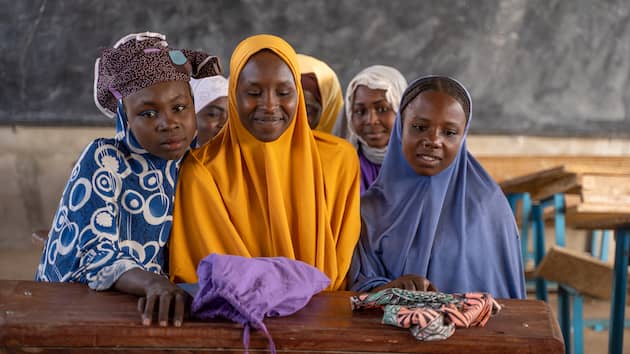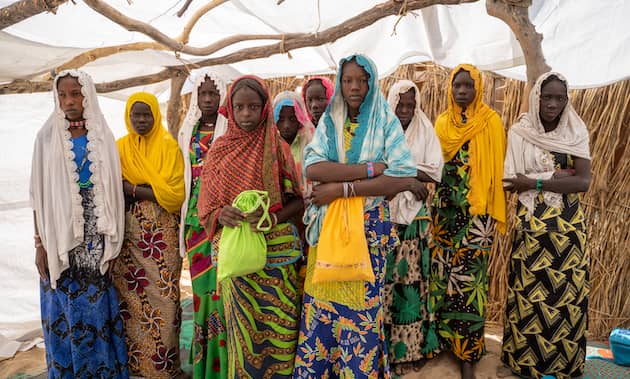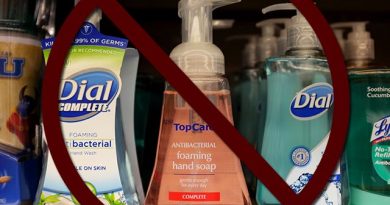Breaking Menstruation Taboos
By Joyce Chimbi
Fourteen-year-old Hadiza smiles as she clutches a purple bag in her hands. Inside the cloth bag is a Menstrual Hygiene Management kit, an essential item that gives her dignity and enables her to continue with school even when menstruating.
Uncomfortable, in fear of being publicly shamed and ridiculed by their peers when they stain their clothes or period blood runs down their legs for lack of hygiene kits, an estimated one in every ten girls in sub-Saharan Africa miss school during their menstrual cycle.

In emergency and crisis settings, such as Lake Chad’s volatile and precarious security situation, young and adolescent girls are generally twice as likely to be out of school and face significant barriers to education.
Lake Chad is home to an estimated 19,000 refugees, 407,000 internally displaced persons (IDPs), and 29,000 returnees, according to UNHCR statistics. Conflict-induced gender barriers to education and a lack of menstrual hygiene products and education around menstruation have long compounded difficulties girls face within the education system in Chad.
“When girls have their period, they feel ashamed to go to school. The first time I had my period, I felt scared and thought I was sick,” says Hadiza, who attends Espoir School, explaining that she experienced these emotions even though her mother and grandmother had told her what to expect.

To ensure young and adolescent girls in Lake Chad and Logone Oriental region do not face additional inequality and fall further behind in their education, the Jesuit Refugee Service (JRS) Chad – in consortium with ACRA Foundation and the Liaison Unit for Women’s Associations (CELIAF in French), and the support of UNICEF – has participated in the production and distribution of Menstrual Hygiene Management (MHM) kits.
These kits are locally manufactured by the Tchad Helping Hand Foundation.
Education Cannot Wait (ECW), the UN’s global fund for education in emergencies and protracted crises, also funds this MHM initiative. The initiative has included several MHM awareness-raising campaigns, training for schools and communities in the area, and the construction of hygiene facilities, such as toilets, to allow girls to properly manage their periods while attending classes.
“We must break down barriers that keep young and adolescent girls, like Hadiza, from the classroom. This is precisely what Education Cannot Wait is doing through our support of menstrual hygiene management for girls in Chad and other crisis-affected countries. Together with our partners on the ground, we ensure that girls no longer miss class during their period. This is a crucial investment in the education and futures of girls,” says ECW Director Yasmine Sherif. “Only when we remove each barrier so that girls can stay in school and complete secondary education can we build more inclusive, equal, resilient, and prosperous communities.”
“The initiative seeks to break the taboo around menstruation in schools. We have come a long way. Teachers are talking about menstrual hygiene management to their students without embarrassment or shame,” says Denis Codjo Hounzangbe, JRS Chad Country Director.
“This Menstrual Hygiene Management intervention includes the establishment of girls’ clubs which are helping break the silence around the issue of menstruation. Targeted girls learn about menstruation, start to speak freely about it, and sensitize their peers on the importance of hygiene management kits for regular school attendance.”
Hounzangbe says distributed hygiene products protect girls from public shame, missing classes, or dropping out of school. Additionally, he states that the impact of sensitization around menstruation in the community is evident.
“Some of the students’ mothers are now able to space their births. Before the intervention, they had no knowledge of their menstruation cycle,” he observes.
The education system in Lake Chad is strained, and the learning environment is challenging. However, there are more than 6,000 refugee and internally displaced students attending local schools now receiving much-needed support in menstrual hygiene management, according to Jesuit Refugee Service Chad.
Targeted recipients include refugee girls, returnees, and indigenous pupils, including girls with disabilities such as 15-year-old Malembe, who fled Nigeria to Chad in 2019 for fear of being attacked by insurgents known as Boko Haram.
Dar es Salam camp, Malembe’s new home, includes 5,772 children, 41 teachers, and 39 classrooms. She says the intervention has improved her and other girls’ quality of life.
Teacher Souhadi lauds the initiative for training teachers in MHM, which he says is critical to building a safe and inclusive environment for all students. He teaches at the Malmairi school, whose 621 students include 360 girls. All six teachers are men.
“There was a girl in the classroom, sitting on the mat. It was during the second break, and we were about to go home. When she stood up, her classmates noticed she was stained with blood,” he says.
“The girl was ashamed and did not want to get back up. I approached the girl to console her. I told her that she should not be ashamed, that she was not the only one having a period and would not be the last one either. That it is natural for all women and girls.”
The teacher finally convinced the shaken girl not to stay home because of her period. The teachers washed the stained mat, and the next day, the girl came to school and has since attended school without fail.
Souhadi asserts that the MHM training was beneficial for all teachers “because we learned to find the correct words to reassure girls that what is happening to them is a natural process.”
Bana Gana, 15, agrees. Menstruation used to prevent her from going to school.
“Before the JRS menstrual hygiene management kit, I had nothing to wear during my period. I just wore a skirt or underwear without any protection,” she recalls.
Against the backdrop of Chad having a very young population, with an estimated 58 percent of the entire population being under 20 years of age, the importance of improving access to education for all children cannot be overemphasized.
IPS would like to thank JRS and Irene Galera, JRS West Africa and Great Lakes Communications Officer, for collecting the testimonials.


